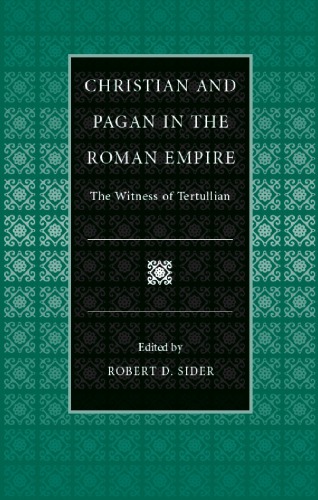

Most ebook files are in PDF format, so you can easily read them using various software such as Foxit Reader or directly on the Google Chrome browser.
Some ebook files are released by publishers in other formats such as .awz, .mobi, .epub, .fb2, etc. You may need to install specific software to read these formats on mobile/PC, such as Calibre.
Please read the tutorial at this link: https://ebookbell.com/faq
We offer FREE conversion to the popular formats you request; however, this may take some time. Therefore, right after payment, please email us, and we will try to provide the service as quickly as possible.
For some exceptional file formats or broken links (if any), please refrain from opening any disputes. Instead, email us first, and we will try to assist within a maximum of 6 hours.
EbookBell Team

4.8
94 reviewsAmong the voices that come across the centuries from early Christianity, few speak with sharper accents, or in more highly colored tones, than that of Tertullian. First in the Latin-speaking West to leave a major corpus of writings, Tertullian is also the first in the West to address in both treatise and tract the issues confronted by Christians in their encounter with the surrounding pagan world.
Tertullian belonged to an era when Roman imperial power was at its height and paganism could proudly claim the blessings of the widespread Roman civilization. Though it was an officially tolerant world, unofficially it was suspicious of the politically incorrect: challenging social structures was an act of unthinkable bravado. Tertullian took on the challenge.
Before his conversion, Tertullian appears to have participated fully in his contemporary pagan culture. A Carthaginian, his education was thoroughly Roman; he was fluent in Latin and Greek, and widely read in literature, philosophy, rhetoric, and medicine. His conversion to Christianity brought to him a radically new vision of the world, while his pagan education provided him with the tools to express that vision with almost unparalleled power. He possessed a logic that penetrated through misty ambiguities to the heart of things; he practiced a formulaic style that sharpened inherent contrasts; and he refined a narrative art that enriched theology with vignettes of the pagan and Christian worlds of his day.
Tertullian is a primary source for a modern understanding of the issues that once confronted--and still confront--Christians living in a non-Christian world. Unfortunately, his writings have often been cast aside as too difficult to read. In this volume, Robert D. Sider undertakes a judicious pruning of the original texts and brings a fresh accessibility to the important writings of Tertullian.
"A very helpful anthology of [Tertullian's] works in an inexpensive and accessible format, one which allows modern readers to